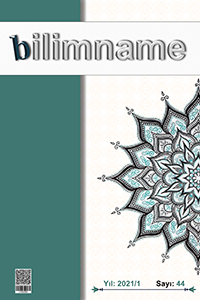An anonymous treatise on al-umur al-ammah dedicated to sultan suleyman the lawgiver: a new perspective in the context of interpretation of irreducibility
Öz
Anahtar Kelimeler
Islamic philosophy Ottoman philosophy Treatise of al-umūr al-āmmah Sharh al-Mawāqif Hatībzāde
Kaynakça
- AHMEDNAGARÎ, Abdünnebi. Düstûru’l-‘ulemâ ev câmi‘u’l-‘ulûm fî ıstılâhâti’l-fünûn. tsh. Hasan Hânî Fahs. Beyrut: Dâru’l-kütübi’l-‘ilmiyye, 2000.
- Anonim Umûr-ı Âmme Risâlesi. Burdur: İl Halk Kütüphanesi, 68, 107b-110b.
- APAYDIN, Yasin. “Kara Seydî-i Hamîdî ve Umûr-ı Âmmeye Dair Risâlesinin Tahlil, Tahkik ve Tercümesi”. Darulfunun İlahiyat, 29/2 (2018).
- APAYDIN, Yasin. Metafiziğin Meselesini Temellendirmek: Tecrîd Geleneği Bağlamında Umûr-ı Âmme Sorunu. İstanbul: Endülüs Yayınları, 2019.
- ARICI, Mustakim. “Bir Otorite Olarak Seyyid Şerif Cürcânî ve Osmanlı İlim Hayatındaki Yeri”. İslam Düşüncesinde Süreklilik ve Değişim: Seyyid Şerif Cürcânî Örneği. ed. M. Cüneyt Kaya. İstanbul: Klasik Yayınları, 2015.
- CÜRCÂNÎ, Seyyid Şerif. Hâşiye ‘alâ Şerhi’l-Metâli’. İstanbul: Matbaa-i Âmire, 1277.
- CÜRCÂNÎ, Seyyid Şerif. Hâşiyetü’t-Tecrîd. thk. Eşref Altaş vd. İstanbul: Türkiye Diyanet Vakfı İslam Araştırmaları Merkezi, 2020.
- CÜRCÂNÎ, Seyyid Şerif. Şerhu’l-Mevâkıf. İstanbul: Matbaa-i Âmire, 1311.
- HASAN ÇELEBÎ. Hâşiye ‘alâ Şerhi’l-Mevâkıf. Mısır: Matbaa-i Saâde, 1907.
- HATİBZÂDE, Muhyiddin Mehmed. Hâşiye ‘alâ Hâşiyeti’t-Tecrîd. İstanbul: Süleymaniye Kütüphanesi, Fatih, 2926, 1b-388a.
- İBN HALDUN. Mukaddimetü İbn Haldun. thk. Mustafa Şeyh Mustafa. Beyrut: Müessesetü’r-Risâle Nâşirûn, 2007.
- İBN SÎNÂ. ‘Uyûnü’l-hikme. thk. Abdurrahman Bedevî. Kuveyt: Vekâletü’l-matbû‘ât, 1980.
- ÎCÎ, Adudüddîn. el-Mevâkıf fî ‘ilmi’l-kelâm. Beyrut: Âlemü’l-kütüb, ts.
- İPŞİRLİ, Mehmet. “Hacıhasanzâde Efendi”. Türkiye Diyanet Vakfı İslâm Ansiklopedisi. İstanbul: TDV Yayınları, 1996, 14/503.
- İZGİ, Cevat. Osmanlı Medreselerinde İlim: Riyâzî ve Tabiî İlimler. İstanbul: Klasik Yayınları, 2019.
- ÖZTURAN, Mehmet. “Yüklemlemenin Anlamı: Tecrîdü’l-i‘tikâd Üzerine Bir İnceleme”. Beytulhikme Felsefe Dergisi, 10/1 (2020).
- KÂTİBÎ, Necmeddîn. el-Münassas fî Şerhi’l-Mülahhas. İstanbul: Süleymaniye Kütüphanesi, Şehit Ali Paşa, 1680, 1b-628a.
- KÂTİP ÇELEBİ. Keşfü’z-zunûn ‘an esâmi’l-kütübi ve’l-fünûn. Ankara: Milli Eğitim Bakanlığı, 1947.
- KUŞÇU, Ali. Şerhu Tecrîdi’l-‘akâid. thk. Muhammed Hüseyin ez-Zâri‘î er-Rıdâyî. Kum: Râid, 2014.
- MOLLA LUTFİ. es-Seb‘u’ş-şidâd. İstanbul: Süleymaniye Kütüphanesi, Carullah, 1341, 100b-102b.
- RÂZÎ, Fahreddin. el-Mülahhas fi’l-hikme ve’l-mantık. İstanbul: Süleymaniye Kütüphanesi, Ragıp Paşa, 877, 1b-353b.
- SÜBKÎ, Tâcüddîn. Mu‘îdü’n-ni‘am: Makam ve Meslek Ahlâkı. nşr. Harun Yılmaz-Muhammed Enes Midilli. İstanbul: Türkiye Yazma Eserler Kurumu Başkanlığı Yayınları, 2019.
- ŞEN, İsrafil. Şerhu’l-Mevâkıf ve Hâşiyeleri Bağlamında Naklî Delilin Kesinliği Problemi. İstanbul: İstanbul Üniversitesi, Sosyal Bilimler Enstitüsü, Yüksek Lisans Tezi, 2020.
- TAŞKÖPRÎZÂDE, Ahmed efendi. eş-Şekâ’iku’n-nu‘mâniyye fî ‘ulemâi’d-devleti’l-‘usmâniyye. thk. Seyyid Muhammed Tabâtabâî Bahbahânî. Tahran: Ketabhâne müze ve merkez-i isnâd-i meclis-i şûrâ-yı islâmî, 2010.
- TAŞKÖPRÎZADE, Ahmed Efendi. Miftâhü’s-Sa‘âde ve Misbâhü’s-Siyâde fî Mevzûâti’l-‘Ulûm. Beyrut: Dâru’l-kütübi’l-‘ilmiyye, 1985.
- TAŞKÖPRÎZÂDE, Ahmed Efendi. Hâşiye ‘alâ Hâşiyeti’t-Tecrîd. İstanbul: Süleymaniye Kütüphanesi, Ragıp Paşa, 732, 1b-223a.
- TÛSÎ, Nasîruddîn. Tecrîdü’l-i‘tikâd. thk. Muhammed Cevâd el-Hüseynî el-Celâlî. Kum: Mektebü’l-a‘lâmi’l-islâmî, 1407.
- YEZDÎ, Abdullah. Şerhu’t-Tehzîb ma‘a hâşiyetihî’l-cedîdeti’l-müsemmâ ferahu’t-takrîb. Karaçi: Mektebetü’l-Medîne, 2018.
- YUSUF B. ABDURRAHMAN. Fevâid müte‘allika bi’l-umûri’l-âmme. İstanbul: Beyazıt Kütüphanesi, Veliyüddin Efendi, 2186, 160a-162b.
Öz
Anahtar Kelimeler
İslam Felsefesi Osmanlı Felsefesi Umûr-ı âmme risâlesi Şerhu'l-Mevâkıf Hatibzâde
Kaynakça
- AHMEDNAGARÎ, Abdünnebi. Düstûru’l-‘ulemâ ev câmi‘u’l-‘ulûm fî ıstılâhâti’l-fünûn. tsh. Hasan Hânî Fahs. Beyrut: Dâru’l-kütübi’l-‘ilmiyye, 2000.
- Anonim Umûr-ı Âmme Risâlesi. Burdur: İl Halk Kütüphanesi, 68, 107b-110b.
- APAYDIN, Yasin. “Kara Seydî-i Hamîdî ve Umûr-ı Âmmeye Dair Risâlesinin Tahlil, Tahkik ve Tercümesi”. Darulfunun İlahiyat, 29/2 (2018).
- APAYDIN, Yasin. Metafiziğin Meselesini Temellendirmek: Tecrîd Geleneği Bağlamında Umûr-ı Âmme Sorunu. İstanbul: Endülüs Yayınları, 2019.
- ARICI, Mustakim. “Bir Otorite Olarak Seyyid Şerif Cürcânî ve Osmanlı İlim Hayatındaki Yeri”. İslam Düşüncesinde Süreklilik ve Değişim: Seyyid Şerif Cürcânî Örneği. ed. M. Cüneyt Kaya. İstanbul: Klasik Yayınları, 2015.
- CÜRCÂNÎ, Seyyid Şerif. Hâşiye ‘alâ Şerhi’l-Metâli’. İstanbul: Matbaa-i Âmire, 1277.
- CÜRCÂNÎ, Seyyid Şerif. Hâşiyetü’t-Tecrîd. thk. Eşref Altaş vd. İstanbul: Türkiye Diyanet Vakfı İslam Araştırmaları Merkezi, 2020.
- CÜRCÂNÎ, Seyyid Şerif. Şerhu’l-Mevâkıf. İstanbul: Matbaa-i Âmire, 1311.
- HASAN ÇELEBÎ. Hâşiye ‘alâ Şerhi’l-Mevâkıf. Mısır: Matbaa-i Saâde, 1907.
- HATİBZÂDE, Muhyiddin Mehmed. Hâşiye ‘alâ Hâşiyeti’t-Tecrîd. İstanbul: Süleymaniye Kütüphanesi, Fatih, 2926, 1b-388a.
- İBN HALDUN. Mukaddimetü İbn Haldun. thk. Mustafa Şeyh Mustafa. Beyrut: Müessesetü’r-Risâle Nâşirûn, 2007.
- İBN SÎNÂ. ‘Uyûnü’l-hikme. thk. Abdurrahman Bedevî. Kuveyt: Vekâletü’l-matbû‘ât, 1980.
- ÎCÎ, Adudüddîn. el-Mevâkıf fî ‘ilmi’l-kelâm. Beyrut: Âlemü’l-kütüb, ts.
- İPŞİRLİ, Mehmet. “Hacıhasanzâde Efendi”. Türkiye Diyanet Vakfı İslâm Ansiklopedisi. İstanbul: TDV Yayınları, 1996, 14/503.
- İZGİ, Cevat. Osmanlı Medreselerinde İlim: Riyâzî ve Tabiî İlimler. İstanbul: Klasik Yayınları, 2019.
- ÖZTURAN, Mehmet. “Yüklemlemenin Anlamı: Tecrîdü’l-i‘tikâd Üzerine Bir İnceleme”. Beytulhikme Felsefe Dergisi, 10/1 (2020).
- KÂTİBÎ, Necmeddîn. el-Münassas fî Şerhi’l-Mülahhas. İstanbul: Süleymaniye Kütüphanesi, Şehit Ali Paşa, 1680, 1b-628a.
- KÂTİP ÇELEBİ. Keşfü’z-zunûn ‘an esâmi’l-kütübi ve’l-fünûn. Ankara: Milli Eğitim Bakanlığı, 1947.
- KUŞÇU, Ali. Şerhu Tecrîdi’l-‘akâid. thk. Muhammed Hüseyin ez-Zâri‘î er-Rıdâyî. Kum: Râid, 2014.
- MOLLA LUTFİ. es-Seb‘u’ş-şidâd. İstanbul: Süleymaniye Kütüphanesi, Carullah, 1341, 100b-102b.
- RÂZÎ, Fahreddin. el-Mülahhas fi’l-hikme ve’l-mantık. İstanbul: Süleymaniye Kütüphanesi, Ragıp Paşa, 877, 1b-353b.
- SÜBKÎ, Tâcüddîn. Mu‘îdü’n-ni‘am: Makam ve Meslek Ahlâkı. nşr. Harun Yılmaz-Muhammed Enes Midilli. İstanbul: Türkiye Yazma Eserler Kurumu Başkanlığı Yayınları, 2019.
- ŞEN, İsrafil. Şerhu’l-Mevâkıf ve Hâşiyeleri Bağlamında Naklî Delilin Kesinliği Problemi. İstanbul: İstanbul Üniversitesi, Sosyal Bilimler Enstitüsü, Yüksek Lisans Tezi, 2020.
- TAŞKÖPRÎZÂDE, Ahmed efendi. eş-Şekâ’iku’n-nu‘mâniyye fî ‘ulemâi’d-devleti’l-‘usmâniyye. thk. Seyyid Muhammed Tabâtabâî Bahbahânî. Tahran: Ketabhâne müze ve merkez-i isnâd-i meclis-i şûrâ-yı islâmî, 2010.
- TAŞKÖPRÎZADE, Ahmed Efendi. Miftâhü’s-Sa‘âde ve Misbâhü’s-Siyâde fî Mevzûâti’l-‘Ulûm. Beyrut: Dâru’l-kütübi’l-‘ilmiyye, 1985.
- TAŞKÖPRÎZÂDE, Ahmed Efendi. Hâşiye ‘alâ Hâşiyeti’t-Tecrîd. İstanbul: Süleymaniye Kütüphanesi, Ragıp Paşa, 732, 1b-223a.
- TÛSÎ, Nasîruddîn. Tecrîdü’l-i‘tikâd. thk. Muhammed Cevâd el-Hüseynî el-Celâlî. Kum: Mektebü’l-a‘lâmi’l-islâmî, 1407.
- YEZDÎ, Abdullah. Şerhu’t-Tehzîb ma‘a hâşiyetihî’l-cedîdeti’l-müsemmâ ferahu’t-takrîb. Karaçi: Mektebetü’l-Medîne, 2018.
- YUSUF B. ABDURRAHMAN. Fevâid müte‘allika bi’l-umûri’l-âmme. İstanbul: Beyazıt Kütüphanesi, Veliyüddin Efendi, 2186, 160a-162b.
Ayrıntılar
| Birincil Dil | Türkçe |
|---|---|
| Bölüm | Makaleler |
| Yazarlar | |
| Yayımlanma Tarihi | 30 Nisan 2021 |
| Gönderilme Tarihi | 15 Ocak 2021 |
| Kabul Tarihi | 29 Nisan 2021 |
| Yayımlandığı Sayı | Yıl 2021 Cilt: 2021 Sayı: 44 |


